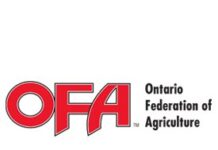In this edition of the Times, you will read a news release from our local Member of Parliament, Eric Duncan, outlining his and his party’s comments on the federal budget which was released on March 28. MP Duncan is well known to North Dundas residents, having formerly served as Mayor of North Dundas before his move to federal politics. MP Duncan was gracious enough to engage in a phone interview to share his thoughts on how the budget will affect local individuals and families. The interview transcript follows.
Q: Is there anything in the budget that will benefit or hurt people in SD&G, particularly those in predominantly rural communities such as North Dundas?

A: I think the budget has a lot of missed opportunities. One of the things that frustrates me is the continuation of the increase of the carbon tax, and the plan to do all of that. The carbon tax has been proven to be ineffective in lowering emissions, and I think what it’s doing particularly in rural areas is driving up the cost of groceries and home heating at a time when inflation is very high, and people on a fixed budget have dollars stretched very thin. I think in principle, the idea of not acknowledging what the carbon tax is doing, and in many cases not doing as they claimed it would, is not good. One of the other things is high speed internet access in rural areas. Not only looking at the budget, but the auditor general report. An independent auditor general just came out with an audit on the government’s performance with high speed internet, and they are showing again that they promise in a budget billions of dollars and how they’re going to connect more people than ever before, but then when it comes to their actual spending and their actual outcomes, they’re very slow, very delayed, and it’s not effective in terms of the amount of money and what they’re spending it on. So again, in the budget, when we see things in our area, like better high speed internet access, they promise money, and it either gets left unspent in many cases, or it doesn’t actually improve things. Only 60% of the people in rural and remote Canada have high speed internet. The constant recycling of the same broken promises is frustrating.
Q: This budget seems to be trying to tackle affordability issues with new spending. Do you think that will help?
A: I think that we’re in the mess that we are in financially because of inflation. As it’s now been proven and as the government acknowledges in their own document, high spending, out of control spending that we’ve had at unsustainable levels has contributed to inflation. So now they’re saying, we can’t spend too much, because it might hurt inflation, that’s acknowledging that they’ve caused this in the first place, but like a lot of the programs they offer, the devil is in the details in terms of what the programs are. They are offering these because they created the mess in the first place in terms of the financial affordability crisis. I think there are a lot of things they could just do. One of the things we’ve said is don’t increase taxes. Don’t increase the carbon tax, don’t increase the tax on beer and wine, and actually make some incentives to keep more money in people’s pockets in the first place. They’re raising taxes in one hand, and then offering rebates on the other. If they just lowered taxes in that threshold for everybody, we’d be a lot better off, and I think businesses would stop adding to things like grocery prices that are still going up by double digits and so forth. This budget is just doubling down on their very same approach that got us into this mess in the first place.
Q: There seems to be significant investments in green technology and machinery in this new budget. Do you predict that we will see any impact from these investments locally?
A: Locally, I hope. You would hope that any time there is new investment or business coming in, you hope that our area would get the same share, but I’m waiting on some of the details to see exactly what is going to go where, and making sure that at the end of the day, the government is not picking winners and losers in this. Very often when the government gets involved in these things, what can happen is it creates a lopsided scale that actually turns other types of investments away. I haven’t specifically seen the line by line of this. I know there is a competition with the United States to address some of their changes, but I think we’ve seen a lot of times that when the government comes in with a proposal, or they inject money, they actually drive the cost of doing that business up. I’m skeptical on many things that they do, they claim it’s going to fix or solve a problem, when instead it just costs more to do the thing in the first place.
Q: Do you have any examples of a how a Conservative budget would look different?
A: For sure. We would be lowering taxes and not increasing them. For example, the carbon tax and that being a key part of affordability, the cost of doing business, and the cost of keeping the price of goods down and not increasing by these record amounts. And I think we have to get our spending under control. The number one reason we’re in this cost of living inflationary crisis right now is because the government has spent more than they are taking in. The government does not have a revenue problem. Their revenues have skyrocketed. Whenever inflation is going up at a grocery store by 10-15%, that means the government gets more HST. They’re getting more revenue than ever before, and they still can’t balance the budget – they’ve got a spending problem. We are in this mess in the first place because of what is happening in policies. To me, it’s just a doubling down on the same approach. It is no surprise the we’re not supporting the budget. We’ve outlined what we would do differently – for every new dollar in spending, find a new dollar in savings. These are things that can help us get some more sustainable spending and get inflation under control.


